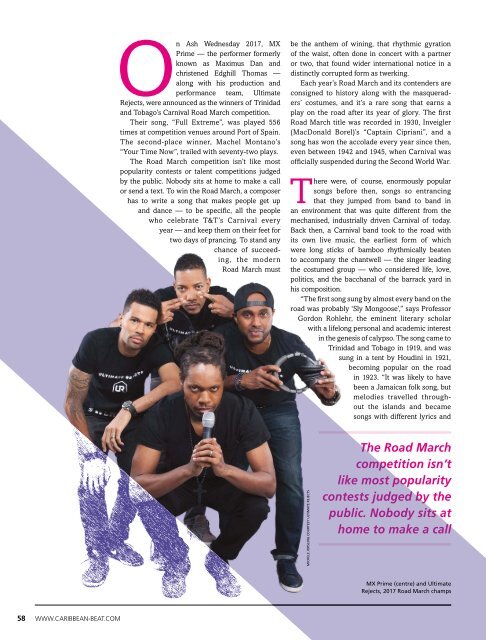Caribbean Beat — January/February 2018 (#149)
A calendar of events; music, film, and book reviews; travel features; people profiles, and much more.
A calendar of events; music, film, and book reviews; travel features; people profiles, and much more.
You also want an ePaper? Increase the reach of your titles
YUMPU automatically turns print PDFs into web optimized ePapers that Google loves.
On Ash Wednesday 2017, MX<br />
Prime <strong>—</strong> the performer formerly<br />
known as Maximus Dan and<br />
christened Edghill Thomas <strong>—</strong><br />
along with his production and<br />
performance team, Ultimate<br />
Rejects, were announced as the winners of Trinidad<br />
and Tobago’s Carnival Road March competition.<br />
Their song, “Full Extreme”, was played 556<br />
times at competition venues around Port of Spain.<br />
The second-place winner, Machel Montano’s<br />
“Your Time Now”, trailed with seventy-two plays.<br />
The Road March competition isn’t like most<br />
popularity contests or talent competitions judged<br />
by the public. Nobody sits at home to make a call<br />
or send a text. To win the Road March, a composer<br />
has to write a song that makes people get up<br />
and dance <strong>—</strong> to be specific, all the people<br />
who celebrate T&T’s Carnival every<br />
year <strong>—</strong> and keep them on their feet for<br />
two days of prancing. To stand any<br />
chance of succeeding,<br />
the modern<br />
Road March must<br />
be the anthem of wining, that rhythmic gyration<br />
of the waist, often done in concert with a partner<br />
or two, that found wider international notice in a<br />
distinctly corrupted form as twerking.<br />
Each year’s Road March and its contenders are<br />
consigned to history along with the masqueraders’<br />
costumes, and it’s a rare song that earns a<br />
play on the road after its year of glory. The first<br />
Road March title was recorded in 1930, Inveigler<br />
(MacDonald Borel)’s “Captain Cipriani”, and a<br />
song has won the accolade every year since then,<br />
even between 1942 and 1945, when Carnival was<br />
officially suspended during the Second World War.<br />
There were, of course, enormously popular<br />
songs before then, songs so entrancing<br />
that they jumped from band to band in<br />
an environment that was quite different from the<br />
mechanised, industrially driven Carnival of today.<br />
Back then, a Carnival band took to the road with<br />
its own live music, the earliest form of which<br />
were long sticks of bamboo rhythmically beaten<br />
to accompany the chantwell <strong>—</strong> the singer leading<br />
the costumed group <strong>—</strong> who considered life, love,<br />
politics, and the bacchanal of the barrack yard in<br />
his composition.<br />
“The first song sung by almost every band on the<br />
road was probably ‘Sly Mongoose’,” says Professor<br />
Gordon Rohlehr, the eminent literary scholar<br />
with a lifelong personal and academic interest<br />
in the genesis of calypso. The song came to<br />
Trinidad and Tobago in 1919, and was<br />
sung in a tent by Houdini in 1921,<br />
becoming popular on the road<br />
in 1923. “It was likely to have<br />
been a Jamaican folk song, but<br />
melodies travelled throughout<br />
the islands and became<br />
songs with different lyrics and<br />
Michele Jorsling courtesy ultimate rejects<br />
The Road March<br />
competition isn’t<br />
like most popularity<br />
contests judged by the<br />
public. Nobody sits at<br />
home to make a call<br />
MX Prime (centre) and Ultimate<br />
Rejects, 2017 Road March champs<br />
58 WWW.CARIBBEAN-BEAT.COM


















